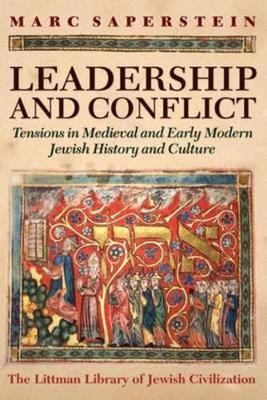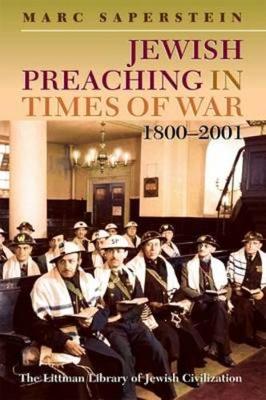The Littman Library of Jewish Civilization
2 total works
This masterly collection of essays offers a multifaceted analysis of how Jewish leaders in medieval and early modern times responded to the challenges presented by a changing world. Based largely on the study of sermons and response - genres that show them addressing real situations in the lives of their people - the book reveals how they handled intellectual, social, and political diversity and conflict. As medieval Jews were exposed to new philosophical ideas, many began to question and challenge rabbinical leadership. Leadership and Conflict explores the process by which these ideas became more accessible, the doubts that consequently arose regarding certain biblical and rabbinic texts, and the attempt by some leaders to ban the study of philosophical texts altogether. The book also addresses the rhetoric of rebuke used by preachers to criticize behavior within their community that they considered to be a violation of Jewish law and tradition. Another set of challenges to traditional Jewish life emerged from political developments in the wider world, including the unification of France, the Spanish Inquisition and Edict of Expulsion, and the beginning of the Counter-Reformation. Leadership and Conflict asks whether criticism of the talent and leadership of rabbis in such times of crisis was justified. The final section of the book is devoted to conflicting attitudes within Jewish society: towards the Holy Land, exile and diasporic existence, and messianic movements and personalities. Leadership and Conflict represents three decades of scholarship by Professor Marc Saperstein, a distinguished historian. Bringing his perceptive essays together in a single volume allows a new generation of students and scholars to have access to his insights and conclusions.
Wartime sermons reveal how Jews perceive themselves in relation to the majority society and how Jewish and national values are reconciled when the fate of a nation is at stake. They also illustrate how rabbis guide their communities through the challenges of their times.
The sermons reproduced here were delivered by American and British rabbis from across the Jewish spectrum-Orthodox to Liberal, Ashkenazi and Sephardi-from the Napoleonic Wars to the attacks of 9/11. Each sermon is prefaced by a comprehensive introduction explaining the context in which it was delivered. Detailed notes explain allusions unfamiliar to a present-day readership and draw comparisons where appropriate to similar passages in contemporary newspapers and other sermons. A general introduction surveys more broadly the distinctive elements of modern Jewish preaching-the new preaching occasions bound up with the history of the countries in which Jews were living; new modes for the dissemination of the sermons (printed pamphlets and the Jewish and general press), and the emergence of women's voices from the pulpit. It also surveys the distinctive themes of modern Jewish sermons, including responses to Jewish suffering, social justice, eulogies for national leaders, Zionism, and war.
What Jewish religious leaders said to their congregations when their countries went to war (or, in some cases, were considering going to war) raises questions of central significance for both modern Jewish history and religious thinking in the civic context. What evidence do these sermons present concerning the degree of patriotism felt by Jews? Where and when do we find examples of dissent from the policies taken by their governments, or explicit criticism? What theological problems are raised by the preachers in the context of unprecedented and unimagined destruction, and how do they respond to these problems? How is the enemy presented in these texts? How is the problem of Jews fighting and killing other Jews addressed? Are the preachers functioning to articulate traditions that challenge the consensus of the moment, or as instruments of social control serving the needs of governments looking for unquestioning support from their citizenry? In all these areas, this book makes an important contribution to the American- and Anglo-Jewish history of this period while also making available a collection of mostly unknown Jewish texts produced at dramatic moments of the past two centuries.
The sermons reproduced here were delivered by American and British rabbis from across the Jewish spectrum-Orthodox to Liberal, Ashkenazi and Sephardi-from the Napoleonic Wars to the attacks of 9/11. Each sermon is prefaced by a comprehensive introduction explaining the context in which it was delivered. Detailed notes explain allusions unfamiliar to a present-day readership and draw comparisons where appropriate to similar passages in contemporary newspapers and other sermons. A general introduction surveys more broadly the distinctive elements of modern Jewish preaching-the new preaching occasions bound up with the history of the countries in which Jews were living; new modes for the dissemination of the sermons (printed pamphlets and the Jewish and general press), and the emergence of women's voices from the pulpit. It also surveys the distinctive themes of modern Jewish sermons, including responses to Jewish suffering, social justice, eulogies for national leaders, Zionism, and war.
What Jewish religious leaders said to their congregations when their countries went to war (or, in some cases, were considering going to war) raises questions of central significance for both modern Jewish history and religious thinking in the civic context. What evidence do these sermons present concerning the degree of patriotism felt by Jews? Where and when do we find examples of dissent from the policies taken by their governments, or explicit criticism? What theological problems are raised by the preachers in the context of unprecedented and unimagined destruction, and how do they respond to these problems? How is the enemy presented in these texts? How is the problem of Jews fighting and killing other Jews addressed? Are the preachers functioning to articulate traditions that challenge the consensus of the moment, or as instruments of social control serving the needs of governments looking for unquestioning support from their citizenry? In all these areas, this book makes an important contribution to the American- and Anglo-Jewish history of this period while also making available a collection of mostly unknown Jewish texts produced at dramatic moments of the past two centuries.

